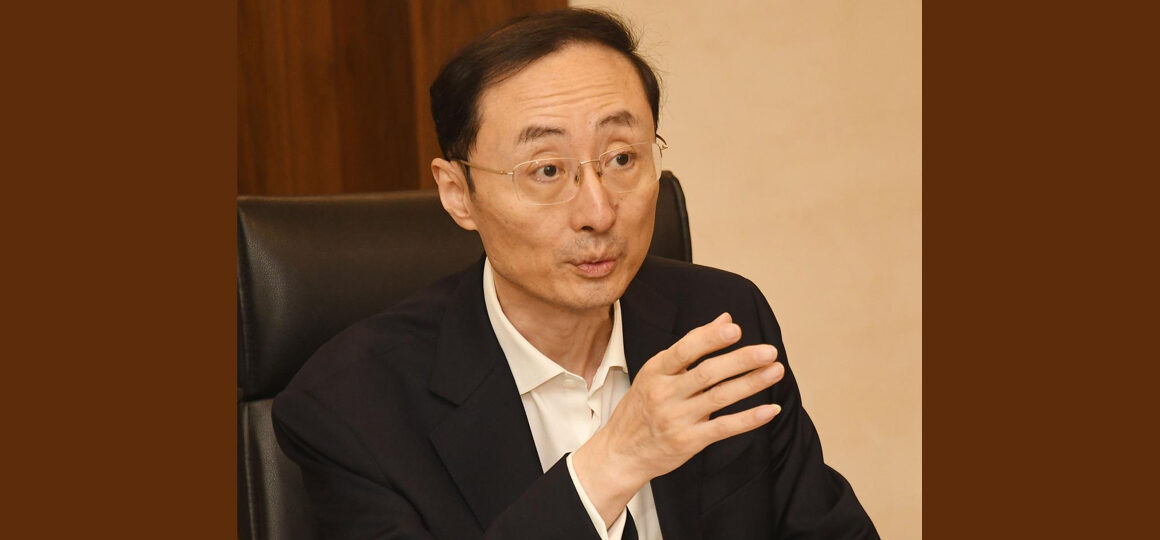In rare media briefing, Ambassador Sun Weidong discusses LAC tensions, Taiwan and terror listings
India and China are seeing a “positive impetus” to ties, given two meetings between the Foreign Ministers in the past few months and Prime Minister Narendra Modi’s attendance at the BRICS (Brazil, Russia, India, China, South Africa) summit in June, Chinese Ambassador to India Sun Weidong said on Saturday.
Mr. Sun noted that China expects to welcome back Indian students to resume their studies in the country in the “near future”. He did not, however, state whether Mr. Modi and Chinese President Xi Jinping would meet in the next few months, when they are both expected to attend the Shanghai Cooperation Organisation summit in Samarkand in September and the G-20 summit in Bali in November.
In his first press conference since the military stand-off at the LAC began after Chinese troops amassed there in April 2020, Mr. Sun defended China’s actions at the Line of Actual Control, as well as the decision to place on hold UN Security Council terror listings for Pakistan-based terrorists, that India had proposed.
Mr. Sun said that the situation at the LAC at present is “overall stable”, and efforts are on to resolve the issue, comments that were at some variance to those of External Affairs Minister S. Jaishankar. Mr. Jaishankar has said that bilateral relations are “far from normal” due to the tensions at the boundary, and that several rounds of talks had not yielded any resolution.
“Since 2020 we have kept diplomatic and military channels open and kept a series of meetings of corps commanders that have resulted in disengagement in some parts. Currently the border is overall stable, and the 16th round of talks (on July 17) ended with a joint statement issued where both sides agreed to continue the talks,” Mr. Sun said, adding that the two sides “would go by the guidance of the leaders [President Xi and PM Modi].”
In Bengaluru on Friday, Mr. Jaishankar had said that the India-China relationship “cannot be normal as the border situation is not normal,” adding that LAC tensions could lead to a “dangerous situation”, and more talks were needed.
In response to a question from The Hindu on terrorism, Mr. Sun insisted there was no contradiction between Beijing’s pronouncements at the BRICS summit and at the UN on countering terror, and its actions on blocking a series of terrorist designations requested by India at the Security Council, including the proposals on LeT deputy chief Abdur Makki and JeM deputy chief Rauf Asghar.
“We [India and China] will keep coordinating on this issue,” said the Chinese Ambassador, “We need some time to study these specific cases, but that doesn’t mean China has changed its position on counter-terrorism cooperation efforts.”
Taiwan situation
Briefing the media on the Taiwan situation, Mr. Sun, who spoke a day after the MEA broke its silence on the tensions in the Taiwan strait, said that the India-China relationship was based on the “One China” principle and called on India to “reiterate” it. On Friday, Ministry of External Affairs spokesperson Arindam Bagchi had called on all parties not to change the status quo over Taiwan, which appeared to be aimed at China for crossing the median line in recent military exercises.
“It is very clear that it is the U.S. that has altered the status quo and undermined peace and stability. China’s measures are justified and legitimate,” Mr. Sun said, referring to U.S. House Speaker Nancy Pelosi’s visit to Taiwan this month.
When asked about the Indian response that did not specifically mention India’s commitment to the PRC-led “One China” policy, Mr. Sun said he did not see a change in India’s stance.
“One China principle is the basis of India-China relations, as well as China’s relations with all other countries. My understanding is India’s One China policy has not changed and we do hope the Indian side will reiterate it,” Mr. Sun said.
The Chinese Ambassador also rejected the idea, that there was any comparison between the tensions between China and Taiwan, and the stand-off at the LAC.
“Taiwan is different in nature as Taiwan is an internal affair, and the solution lies between the Chinese government and the people. China-India boundary question is an issue left by history. This is a boundary dispute, very different from the Taiwan question,” Mr. Sun said when asked if there were similarities in the aggression shown by the Chinese military on both fronts.
India-China ties seeing a positive impetus, says Chinese Ambassador
In rare media briefing, Ambassador Sun Weidong discusses LAC tensions, Taiwan and terror listings
India and China are seeing a “positive impetus” to ties, given two meetings between the Foreign Ministers in the past few months and Prime Minister Narendra Modi’s attendance at the BRICS (Brazil, Russia, India, China, South Africa) summit in June, Chinese Ambassador to India Sun Weidong said on Saturday.
Mr. Sun noted that China expects to welcome back Indian students to resume their studies in the country in the “near future”. He did not, however, state whether Mr. Modi and Chinese President Xi Jinping would meet in the next few months, when they are both expected to attend the Shanghai Cooperation Organisation summit in Samarkand in September and the G-20 summit in Bali in November.
In his first press conference since the military stand-off at the LAC began after Chinese troops amassed there in April 2020, Mr. Sun defended China’s actions at the Line of Actual Control, as well as the decision to place on hold UN Security Council terror listings for Pakistan-based terrorists, that India had proposed.
Mr. Sun said that the situation at the LAC at present is “overall stable”, and efforts are on to resolve the issue, comments that were at some variance to those of External Affairs Minister S. Jaishankar. Mr. Jaishankar has said that bilateral relations are “far from normal” due to the tensions at the boundary, and that several rounds of talks had not yielded any resolution.
“Since 2020 we have kept diplomatic and military channels open and kept a series of meetings of corps commanders that have resulted in disengagement in some parts. Currently the border is overall stable, and the 16th round of talks (on July 17) ended with a joint statement issued where both sides agreed to continue the talks,” Mr. Sun said, adding that the two sides “would go by the guidance of the leaders [President Xi and PM Modi].”
In Bengaluru on Friday, Mr. Jaishankar had said that the India-China relationship “cannot be normal as the border situation is not normal,” adding that LAC tensions could lead to a “dangerous situation”, and more talks were needed.
In response to a question from The Hindu on terrorism, Mr. Sun insisted there was no contradiction between Beijing’s pronouncements at the BRICS summit and at the UN on countering terror, and its actions on blocking a series of terrorist designations requested by India at the Security Council, including the proposals on LeT deputy chief Abdur Makki and JeM deputy chief Rauf Asghar.
“We [India and China] will keep coordinating on this issue,” said the Chinese Ambassador, “We need some time to study these specific cases, but that doesn’t mean China has changed its position on counter-terrorism cooperation efforts.”
Taiwan situation
Briefing the media on the Taiwan situation, Mr. Sun, who spoke a day after the MEA broke its silence on the tensions in the Taiwan strait, said that the India-China relationship was based on the “One China” principle and called on India to “reiterate” it. On Friday, Ministry of External Affairs spokesperson Arindam Bagchi had called on all parties not to change the status quo over Taiwan, which appeared to be aimed at China for crossing the median line in recent military exercises.
“It is very clear that it is the U.S. that has altered the status quo and undermined peace and stability. China’s measures are justified and legitimate,” Mr. Sun said, referring to U.S. House Speaker Nancy Pelosi’s visit to Taiwan this month.
When asked about the Indian response that did not specifically mention India’s commitment to the PRC-led “One China” policy, Mr. Sun said he did not see a change in India’s stance.
“One China principle is the basis of India-China relations, as well as China’s relations with all other countries. My understanding is India’s One China policy has not changed and we do hope the Indian side will reiterate it,” Mr. Sun said.
The Chinese Ambassador also rejected the idea, that there was any comparison between the tensions between China and Taiwan, and the stand-off at the LAC.
“Taiwan is different in nature as Taiwan is an internal affair, and the solution lies between the Chinese government and the people. China-India boundary question is an issue left by history. This is a boundary dispute, very different from the Taiwan question,” Mr. Sun said when asked if there were similarities in the aggression shown by the Chinese military on both fronts.






NO COMMENT